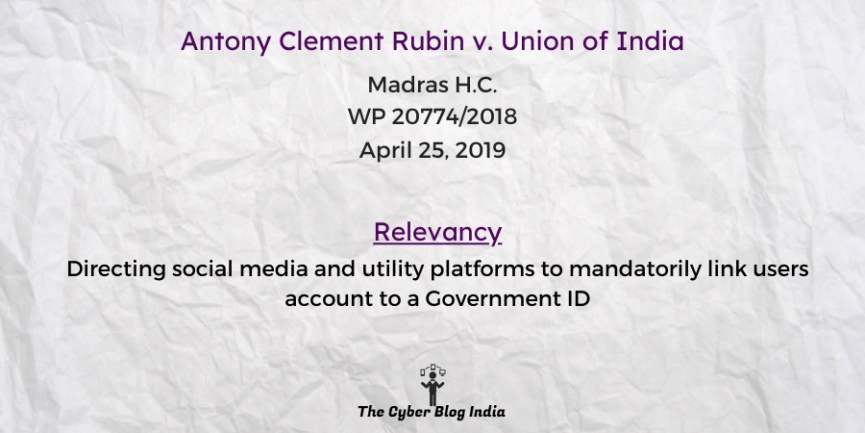Antony Clement Rubin v. Union of India

Antony Clement Rubin v. Union of India
In the High Court of Madras
WP 20774/2018
Before Justice S Manikumar and Justice Subramonium Prasad
Decided on April 25, 2019
Relevancy of the case: Directing social media and utility platforms to mandatorily link users account to a Government ID
Statutes and Provisions Involved
- The Information Technology Act, 2000 (Section 69)
- The Information Technology (Procedure and Safeguards for Interception, Monitoring and Decryption of Information) Rules, 2009
- The Constitution of India, 1950 (Article 226)
- The Code of Criminal Procedure, 1973 (Section 91)
Relevant Facts of the Case
- The petitioner filed writ petitions before the High Court under Article 226 with similar prayers.
- The prayers were twofold. First, they sought to make it mandatory to link any government-authorised identity proof of the user while creating an account for social media like Facebook, Instagram, etc., or a utility account like Paytm, Ola, Gmail, etc.
- Secondly, to appoint a task force to monitor rising instances of cyber defamation and cyber stalking and protect the victimised citizens of India.
Prominent Arguments by the Advocates
- The respondents’ counsel commonly stated that they would collaborate and cooperate with law enforcement agencies.
- WhatsApp’s counsel submitted that when requests are made under Section 91 of the Code of Criminal Procedure, 1973, the Basic Subscriber Information like phone number, name, device information, etc., will be provided to the law enforcement agencies. That on consensus, the respondent intermediaries unanimously agree to provide the Basic Subscriber Information upon a valid request from the law enforcement agencies provided that it is in the prescribed format, to the extent that such information exists and is reasonably accessible.
- Google and YouTube’s counsel had a similar submission like WhatsApp for the type of information they will provide. The learned counsel further submitted that for the complaint mechanism, there is a site that runs 24*7, and whenever law enforcement agencies request information, they will provide it.
- Twitter’s counsel submitted that the law enforcement agencies could contact the place where it is registered (in the U.S.A) for information. When it was not available, they would ask them to contact the appropriate place for the same (in Ireland, where the Grievance Office is situated). It also agreed to provide the type of information as WhatsApp and Google, but not the device information as Twitter may not have the same.
- Facebook’s counsel submitted that it could provide the email ID or phone number used to open the account. Facebook also has a dedicated portal for requests of enforcement agencies.
- The Government’s counsel submitted that there is a difference between ISP (Internet Service provider) and IP (Internet Protocol) and that IP is dynamic and varies frequently. He said that standards of problems like obscenity, morality, etc., vary across the intermediaries. Still, if the information is shared with the law enforcement agencies, crime can be detected and prevented. He submitted that the government has made Information Technology (Procedure and Safeguards for Interception Monitoring and Decryption of Information) Rules, 2009, under which a Nodal officer appointed by all social media platforms should be present.
Opinion of the Bench
- The intermediaries’ duty is to provide information to the law enforcement agencies regarding the originator of the information, etc. when a person’s dignity or liberty is damaged through information sent in any social media.
- The issue of the Grievance Officer can be discussed in the interactive meeting. There is an imminent need for social media to give information sought by the enforcement agencies to stop the spread of instigating information related to caste and religion.
- Law enforcement agencies shall discuss with the technocrats the difficulties related to standards in obtaining information from the intermediaries, which affect subjects like public order, morality, decency, etc. The intermediaries must address these issues taking into note the difficulties faced by the law enforcement agencies to prevent and detect crimes.
- Issue related to the appointment of a specified official to which information may be provided as an authority should also be discussed in the interactive meeting.
- The government of Tamil Nadu should arrange the interactive meeting between the technocrats of WhatsApp, Google, etc., and the officers of law enforcement agencies.
- Ministry of External Affairs should also be impleaded as VISAs and other arrangements are to be expedited.
Final Decision
- Matter listed for 06.06.2019.
